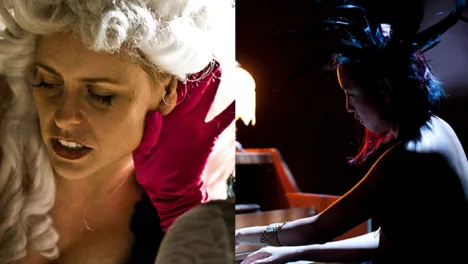
Tip of Her Tongue: Tanya Tagaq - Nanook of the North
Overview
Renowned Canadian-born Inuit improvisational performer, composer, actor, and experimental recording artist Tanya Tagaq performed as part of The Broad’s Tip of Her Tongue feminist performance series on Saturday, October 1. The Broad was the first Los Angeles institution to present a solo performance by Tagaq who won the Polaris Prize in 2014.
Tagaq is known for performances that challenge ideas of genre and culture, and contend with themes of environmentalism, human rights and Indigenous issues. Along with percussionist Jean Martin and violinist Jesse Zubot, she performed a live accompaniment to Robert Flaherty's controversial 1922 film, Nanook of the North, which portrays the lives of an Inuit family in Arctic Canada.
Flaherty’s silent film, considered the world's first major anthropological documentary, is rife with contradictions and incorrect assumptions about Inuit life that persist to this day. One of Tagaq’s most celebrated projects is the artist's reclamation of Flaherty's controversial film through this performance. Tagaq sings over the film, and makes it mean something different.
The Broad’s Tip of Her Tongue series features women performance artists who work with language and the body. Tagaq, like other artists in the series, has a creative practice that mirrors visual artists in the Broad collection such as Kara Walker, Barbara Kruger, Ellen Gallagher, or Jenny Saville, whose representations of the body in their artworks speak loudly about gender and politics in contemporary society. In Nanook of the North, Tagaq pairs her performance with the appropriated images of the Inuit people in Flaherty’s film. In the same way that artists such as Kruger and Walker utilize appropriation to reframe perspectives of the female or African-American body, Tagaq utilizes her body and voice to recontextualize Flaherty's and generally commonly accepted views of Indigenous peoples.
About Tanya Tagaq
Tanya Tagaq won the 2014 Polaris Music Prize for Animism, an album which disrupted the music world in Canada and beyond with its powerfully original vision. Tagaq joined Björk on her 2000 world tour and album Medúlla. She was named one the “10 new artists to know in 2015” by Rolling Stone. Tagaq contorts elements of punk, metal and electronica into a complex and contemporary sound that begins in breath, a communal and fundamental phenomenon. Tagaq will be releasing the follow-up to Animism this fall on Six Shooter Records.
While 2014’s Polaris Music Prize win signaled an awakening to Tagaq’s art and messages, she has been touring and collaborating with an elite international circle of artists for over a decade. Tagaq’s improvisational approach lends itself to collaboration across genres, and recent projects have pulled her in vastly different directions, from contributing guest vocals to a recent F**ked Up song (a hardcore punk band from Toronto) to premiering a new composition made for Kronos Quartet’s Fifty for the Future collection. In numerous interviews, Tagaq has stressed the importance of considering her work in the context of contemporary—not traditional—art. This statement is not just about sound, although her music is decidedly modern and technically intricate, but about deep-rooted assumptions about Indigenous culture in general and Canada in particular.
Tagaq’s exquisite improvisations and expression ferociously refute easy (or lazy) assumptions about contemporary Indigenous art’s relationship to tradition, a style she has perfected over a decade of performances on major stages worldwide.
About Tip of Her Tongue
Barbara Kruger’s Untitled (Your body is a battleground), 1989, is a stark emblem for feminist art practice—if the body is our battleground, it is through language that we fight. Inspired by Kruger's work and by similarly discursive artworks in the Broad collection, The Tip of Her Tongue program series features feminist artists in performance who work with language and embodiment. The artists in this series have intense stories to tell and experiment aggressively with the telling. The artists work with words to explore how the body's relationship to language is mediated by histories large and small. The body may both anchor and disrupt the story. It is a source of desire, grief, shame and laughter. These intimate performances explore the politics of representation—with how gender is produced in, through and as language; and how the stories we tell circulate around, move through, against and with the body.
Read More



